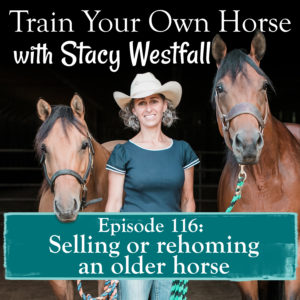Episode 116: Selling or rehoming an older horse
February 3, 2021/

This episode contains general thoughts around selling horses and I answer a listener asks a question about a horse who is aging: how to find him the best next place and be sure that he will be well taken care of.
I discuss reasons for selling, including,
Safety- Training mismatch between horse and rider
Enjoyment- energy level mismatch
financial mismatch- can’t afford to keep them, can’t afford to have multiples
And I offer ideas on how to prevent them from slaughter.
Links mentioned in podcast:
4 Comments
Leave a Comment
SUBSCRIBE TO THE PODCAST HERE:





YOURS FREE
WHY IS MY HORSE...?


Thank you for answering my question, Stacy! You are right that the fear is real of not being able to control what would happen to him if I sold him. I love how you talk about the door opening or closing and I’ll stay hopeful that the right opportunity will present itself. And thank you for reminding me that there are a LOT of good horse owners out there, and that he would probably even enjoy the change. Thankfully I’m still enjoying him and he’s still keeping up with me for now. I feel a bit better informed about what the next few years may look like for us. Thank you!
You are VERY welcome!
Do you have anything to offer us in matching you to a new horse (horse purchase)? How to know which horse will pair up nicely, and how to understand the capabilities of the horse I order to match your goals, and possibly getting a better understanding of what the horse is most interested in before you buy? This last point I can provide an example where we bought a horse which did not enjoy dressage, the endless flat work about the discipline. However, once you put a cow in front of him, he excelled and enjoyed his job. Perhaps we could rephrase saying; how to better understand what the horse would excel at. Do you have a podcast already done on this topic? Is it possible to find direction on these points of interest?
Great questions! I’m going to answer it in tomorrows blog!